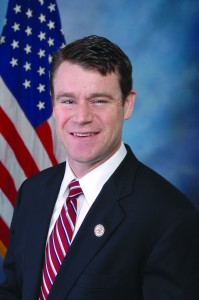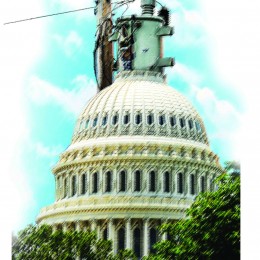by Rep. Todd Young
Federal issues impacting Indiana industries vary a great deal, from trade agreements, to patent reforms, to the tax code.
Yet, problems with regulatory roadblocks aren’t unique. Operations big and small are forced to do more, with less, as a result of costly regulations coming out of Washington.
In recent years, no industry has been hit harder than American energy producers.
By exploiting the Clean Air Act, a law Congress passed in the 1970s, the Environmental Protection Agency (EPA) has crafted regulatory schemes so complex and cost prohibitive, they’ve forced many power producers out of business.
Months ago, the Environmental Protection Agency published its Clean Power Plan. By EPA’s own estimates, it amounts to one of the costliest regulations ever imposed on the domestic energy sector.
In brief, the Clean Power Plan mandates the reduction of power plant emissions to below 2005 levels by 2030.
In practice, these mandates contain impossible-to-meet benchmarks targeting coal-fired electricity and power producers.
As a result, EPA’s plan will lead to the shuttering of up to 90GW of power production, increasing utility rates for families and driving up the cost of consumer goods.
The knee-jerk reaction is to blame the EPA and the Obama administration for issuing such disproportionate rules without so much as a nod to the jobs lost or the economic impact such policies have in places like Southern Indiana.
But the problem is more complicated. Agencies now write the rules, enforce the rules, and then take to task and penalize individuals or businesses that break the rules without ever setting foot in a U.S. court. If federal agencies have appropriated the role of all three branches of government, it is, in part, because Congress let them.
In a rush to get bills passed or to punt on issues, Congress intentionally passes vague legislation so the executive branch can fill in the thornier details via regulation.
As bad as the Obama administration is when it comes to overregulating, all too often Congress is to blame for providing a free license to fill in the blanks.
If we don’t want “unelected bureaucrats” at narrowly focused agencies to legislate by regulatory fiat, Congress must take our oversight role seriously. The EPA exists to monitor the environment, not to monitor jobs. When they take actions detrimental to the economy, Congress should step in.
That’s why I’ve introduced a solution, called the REINS Act, which would require any regulation with an economic impact of $100 million or more to come before Congress for an up or down vote.
Not only would this ensure a cost-benefit analysis is performed before regulations take effect, it would give people a chance to weigh in with their elected representative and force Congress to take a stand on difficult issues.
That way, if Hoosiers happen to lose their job because of misguided rules and regulations they know who to hold accountable at the ballot box.
It’s this sort of common-sense bill Washington must embrace if we want to restore accountability and limit the growth of government.
The House passed the REINS Act months ago; it’s now time for the Senate to do its part. For the 90,000 Hoosiers who responded to the EPA’s Clean Power Plan public comment period, only to have their concerns ignored, this sort of action can’t come soon enough.
REP. TODD YOUNG represents Indiana’s 9th District. A member of the House Ways and Means Committee, he is currently serving his third term in Congress.




